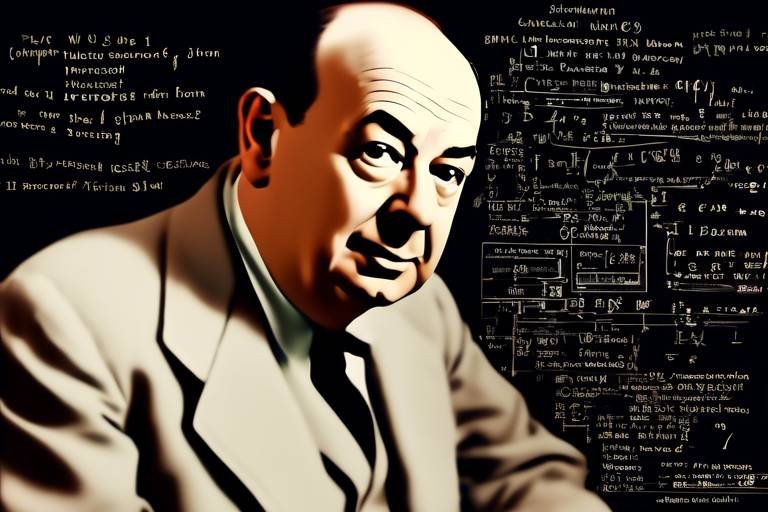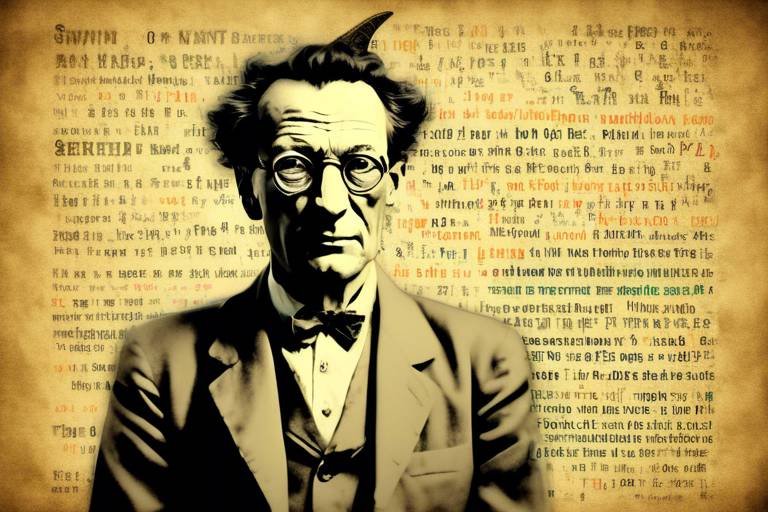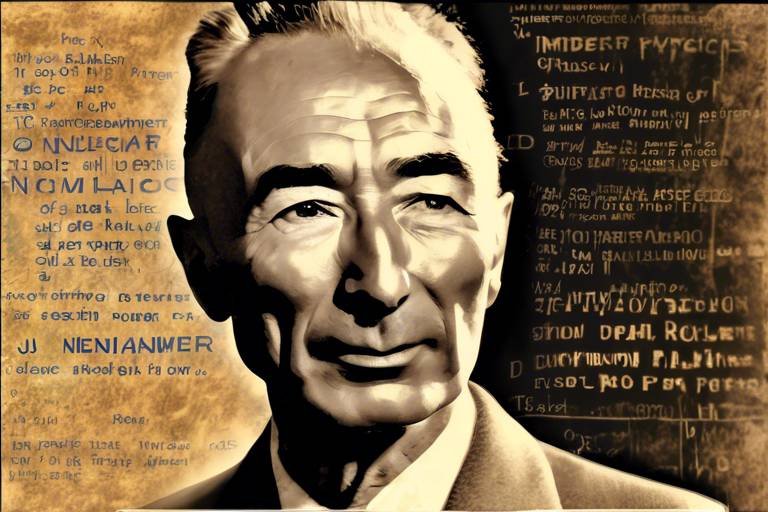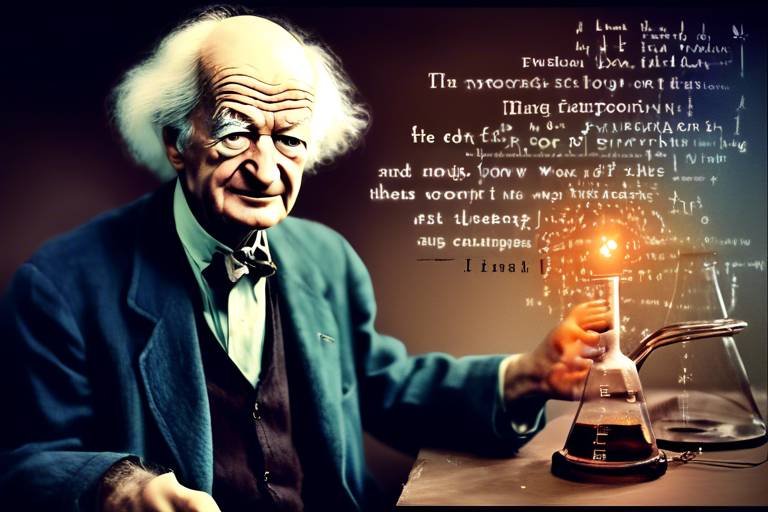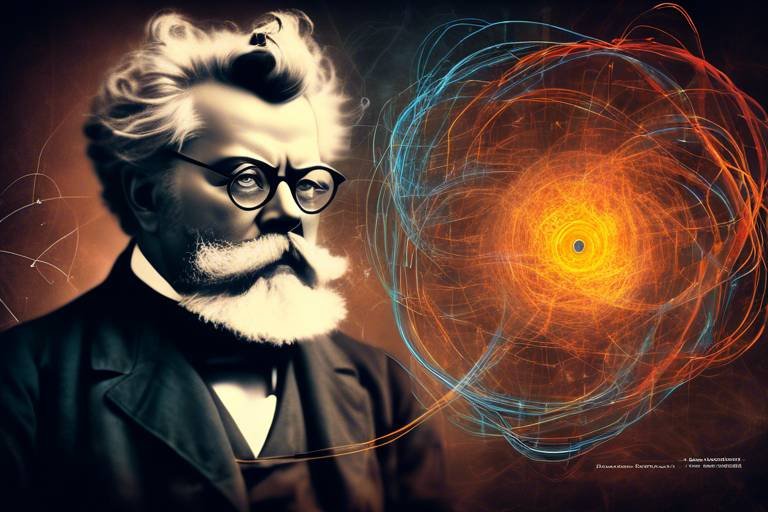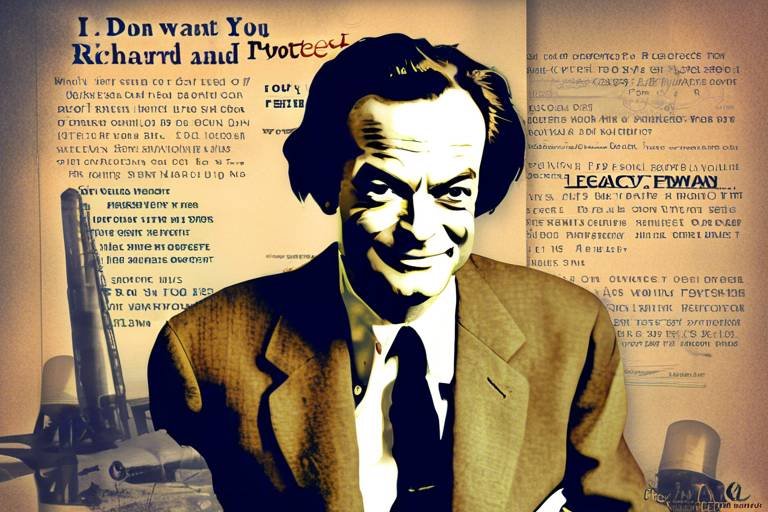The Pioneering Research of John von Neumann in Computer Science
John von Neumann was not just a brilliant mathematician; he was a visionary whose ideas laid the foundation for modern computer science. His groundbreaking contributions have paved the way for the digital age, influencing everything from the design of computers to the very algorithms that drive software today. Imagine a world where computers are mere calculators—this was the state of technology before von Neumann's revolutionary ideas transformed it into the complex, multifaceted systems we rely on now. His work was characterized by a blend of theoretical insight and practical implementation, making him a pivotal figure in the evolution of computing.
Born in 1903 in Budapest, Hungary, von Neumann exhibited prodigious talent from a young age. His early education was steeped in mathematics and physics, disciplines that would later inform his groundbreaking work in computer science. He was a polymath, excelling not only in mathematics but also in fields such as economics and physics. This interdisciplinary approach enabled him to draw connections between seemingly unrelated concepts, leading to innovations that would change the world.
As we delve into his contributions, we see that von Neumann was not merely a passive observer of the technological revolution; he was an active participant and a driving force behind many of the ideas that would shape the future. His theories on computation and algorithms opened doors to areas of research that were previously unimagined. The impact of his work is felt in various fields, from artificial intelligence to game theory, showcasing the breadth of his intellectual reach.
One of von Neumann's most significant contributions is the von Neumann architecture, a design framework that organizes how computers process information. This architecture is still the backbone of most computers today, illustrating how his ideas have stood the test of time. In essence, he proposed a system where a computer's memory, processing unit, and input/output systems interact seamlessly, allowing for more efficient data processing. This revolutionary concept has made it possible for computers to perform complex tasks that were previously thought impossible.
In addition to his architectural contributions, von Neumann's work in game theory has had a profound impact on economics and social sciences. His development of the concept of zero-sum games introduced a new way of understanding competitive scenarios, where one participant's gain is exactly balanced by another's loss. This idea has not only influenced strategic decision-making in business but has also permeated various fields, including political science and psychology.
In summary, John von Neumann's pioneering research and innovative theories have profoundly shaped the landscape of computer science. His legacy is a testament to the power of interdisciplinary thinking and the importance of innovation in driving technological progress. As we continue to explore the depths of computing, it is essential to recognize and honor the contributions of this remarkable individual who helped lay the groundwork for the digital world we inhabit today.
- What is the von Neumann architecture?
The von Neumann architecture is a computer design model that describes a system where the computer's memory, processing unit, and input/output systems work together to process information efficiently.
- How did von Neumann contribute to game theory?
John von Neumann developed the concept of game theory, particularly the idea of zero-sum games, which revolutionized economics and strategic decision-making.
- What was von Neumann's impact on early computers?
He was instrumental in the design of early computers like ENIAC and EDVAC, showcasing his visionary approach to computing technology.
- Why is von Neumann considered a pioneer in computer science?
His innovative theories and practical implementations have fundamentally shaped computer science, influencing everything from architecture to programming languages.

Early Life and Education
John von Neumann was born on December 28, 1903, in Budapest, Hungary. From an early age, it was evident that he possessed a remarkable intellect, often surprising those around him with his ability to grasp complex concepts. His family recognized his potential and provided him with a nurturing environment that emphasized education and intellectual exploration. At just six years old, he could perform advanced mathematical calculations in his head, a talent that would set the stage for his future contributions to science and technology.
Von Neumann's early education took place at the prestigious Lutheran secondary school in Budapest, where he excelled in subjects like mathematics and physics. His thirst for knowledge led him to pursue higher education at the University of Budapest, where he earned a degree in chemical engineering. However, it was his passion for mathematics that truly shone through during this period. He later moved to Germany to continue his studies at the University of Göttingen, a hub for mathematical research. There, he worked with some of the brightest minds of his time, including David Hilbert, one of the foremost mathematicians in history.
During his time at Göttingen, von Neumann developed a deep interest in various mathematical fields, including set theory, topology, and functional analysis. This diverse foundation would later influence his groundbreaking work in computer science and game theory. In 1926, he earned his doctorate in mathematics, and his dissertation focused on the foundations of set theory, showcasing his innovative thinking and ability to tackle complex problems.
Von Neumann's education was not limited to formal institutions; he was also an avid reader and self-learner. He often explored various subjects outside his field, such as physics and economics, which would later inform his interdisciplinary approach to research. His ability to connect ideas across different domains became one of his defining characteristics. As he moved forward in his career, this eclectic background would enable him to tackle problems from multiple angles, leading to groundbreaking innovations.
In summary, John von Neumann's early life and education were characterized by a combination of exceptional talent, a supportive family environment, and a relentless pursuit of knowledge. These factors played a crucial role in shaping his innovative thinking and laid the groundwork for his future contributions to mathematics and computer science. His journey from a gifted child in Budapest to a leading figure in the scientific community exemplifies the power of education and intellectual curiosity.

Mathematical Foundations
John von Neumann's contributions to mathematics were not just impressive; they were revolutionary. His work laid the groundwork for many concepts that are now fundamental in computer science and beyond. One of the key areas where von Neumann made his mark was in set theory, which deals with the study of collections of objects. This foundational framework is crucial for understanding data structures in computer science, as it provides a way to organize and manipulate data efficiently.
Another area where von Neumann excelled was in game theory. Imagine a chess match, where each player must think strategically about their moves, anticipating the opponent's responses. Von Neumann's insights into competitive situations transformed how we analyze interactions, not just in games but also in economics, biology, and social sciences. His theories introduced a mathematical approach to decision-making, emphasizing the importance of strategy in achieving desired outcomes.
To illustrate the significance of von Neumann's work, consider the following table that summarizes some of his major contributions to mathematical foundations:
| Area of Contribution | Key Concepts | Impact |
|---|---|---|
| Set Theory | Sets, Functions, Relations | Foundation for data organization in computing |
| Game Theory | Zero-sum Games, Nash Equilibrium | Revolutionized economics and strategic thinking |
| Functional Analysis | Hilbert Spaces, Operators | Influenced quantum mechanics and computer algorithms |
Von Neumann's mathematical insights were not only theoretical but also practical. His ability to translate complex mathematical concepts into frameworks that could be applied in real-world scenarios was remarkable. For example, his work in game theory led to the development of strategies that businesses use today to optimize their market positions and negotiate deals. It's almost like having a secret playbook that guides decisions in competitive environments!
In summary, John von Neumann's mathematical foundations have had a profound and lasting impact on computer science. His theories in set theory and game theory continue to influence modern algorithms and decision-making processes. Just as a solid foundation is essential for a skyscraper, von Neumann's contributions provide the essential support for the towering achievements of contemporary computing.

Game Theory Innovations
John von Neumann's development of game theory was nothing short of revolutionary, transforming the way we approach economics and strategic decision-making. Imagine a chess game where every move is calculated not just based on your own strategy, but also on anticipating your opponent's responses. This is the essence of game theory, and von Neumann was the mastermind behind it. His work provided a mathematical framework that allows us to analyze competitive situations, making it possible to understand not just the games we play, but also the complex interactions in real-world scenarios.
At its core, game theory offers insights into how rational players make decisions in situations where the outcome depends on the actions of all participants. This theory has found applications across various fields, from economics to biology, and even political science. By using mathematical models, von Neumann and his contemporaries were able to formalize concepts that had previously been understood only in an intuitive sense. The implications of these innovations have been profound, leading to a deeper understanding of cooperation, conflict, and strategy.
One of the most significant aspects of von Neumann's contributions to game theory is the concept of zero-sum games. In a zero-sum game, one player's gain is exactly balanced by the losses of others. This idea reshaped how we view competitive interactions. For example, think of a poker game where the total amount of money in the pot remains constant; any dollar won by one player is a dollar lost by another. This fundamental concept has become a cornerstone in both economics and strategic planning, influencing how businesses and governments approach negotiations and competition.
Furthermore, von Neumann's work laid the groundwork for the development of mixed strategies, where players randomize their actions to keep opponents guessing. This concept has been crucial in various fields, including military strategy and economics, where unpredictability can provide a significant advantage. The ability to calculate optimal strategies based on incomplete information has allowed for more sophisticated models of human behavior and decision-making.
In summary, the innovations brought forth by John von Neumann in game theory not only revolutionized economics but also provided a robust framework for analyzing competitive situations in numerous disciplines. His pioneering work has had lasting impacts, influencing everything from business strategies to political negotiations. As we continue to navigate an increasingly complex world, the principles of game theory will remain essential tools for understanding and strategizing in competitive environments.
- What is game theory?
Game theory is a mathematical framework for analyzing situations in which players make decisions that are interdependent. It helps predict the outcome of strategic interactions.
- Who is John von Neumann?
John von Neumann was a Hungarian-American mathematician, physicist, and computer scientist, known for his foundational contributions to various fields, including game theory and computer architecture.
- What are zero-sum games?
Zero-sum games are situations in which one player's gain is exactly balanced by the losses of others. They are often used to model competitive scenarios.
- How has game theory impacted economics?
Game theory has transformed economics by providing tools to analyze and predict competitive behaviors, influencing market strategies, negotiations, and policy-making.

Zero-Sum Games
Zero-sum games are a fascinating concept introduced by John von Neumann that fundamentally changed how we view competition and strategy. Imagine a scenario where two players are engaged in a duel; every point one player scores is a direct loss for the other. This idea encapsulates the essence of zero-sum games: the total benefit and loss in the game always adds up to zero. In simpler terms, one participant's gain is precisely equal to the other's loss. This concept is not just theoretical; it has practical applications in various fields, including economics, political science, and even psychology.
To illustrate, consider a simple game of poker. The total amount of money in the pot is fixed, and any winnings by one player come directly from the losses of another. This competitive dynamic creates a strategic environment where players must think critically about their moves, anticipate their opponent's actions, and make calculated risks. The beauty of zero-sum games lies in their ability to model real-world competitive situations, allowing analysts and strategists to devise optimal strategies based on the behaviors of their opponents.
Von Neumann's work on zero-sum games led to the development of several key theories and principles, which can be summarized as follows:
- Optimal Strategies: In zero-sum games, players can determine their best course of action by analyzing the strategies of their opponents. This leads to the formulation of optimal strategies that maximize one's chances of winning while minimizing potential losses.
- Nash Equilibrium: Although not directly attributed to von Neumann, the concept of Nash Equilibrium builds on his ideas. It refers to a situation where no player can benefit from changing their strategy if the other players keep theirs unchanged, creating a stable outcome.
- Mixed Strategies: Sometimes, players may need to randomize their strategies to keep their opponents guessing. This approach, known as mixed strategies, can increase the chances of victory in competitive scenarios.
These principles have far-reaching implications, extending beyond games and into real-world applications. For instance, in business negotiations, companies often find themselves in zero-sum situations where one party's advantage can translate into a disadvantage for another. Understanding the dynamics of zero-sum games can provide valuable insights into negotiation tactics, competitive strategies, and overall decision-making processes.
Moreover, zero-sum games have been instrumental in the development of various algorithms and computational techniques used in artificial intelligence and machine learning. By modeling competitive scenarios as zero-sum games, researchers can create systems that can anticipate and counteract the actions of opponents, leading to more effective AI applications in fields such as robotics, finance, and game development.
In conclusion, John von Neumann's introduction of zero-sum games not only revolutionized the field of game theory but also provided a robust framework for understanding competitive interactions in numerous disciplines. His insights continue to resonate today, influencing everything from economic strategies to AI development. The legacy of zero-sum games is a testament to von Neumann's profound impact on both theoretical and practical aspects of science and technology.
- What is a zero-sum game? A zero-sum game is a situation in which one participant's gain is exactly balanced by another participant's loss, resulting in a net change of zero.
- How does zero-sum game theory apply to real life? Zero-sum game theory can be applied in various fields, including economics, business negotiations, and strategic decision-making, where one party's gain results in another's loss.
- What are some examples of zero-sum games? Examples include poker, chess, and competitive sports, where participants compete directly against each other for limited resources or points.
- How can understanding zero-sum games improve negotiation tactics? By understanding the competitive dynamics of zero-sum games, negotiators can develop strategies that maximize their advantage while minimizing the gains of their opponents.

Applications in Economics
The principles of game theory, pioneered by John von Neumann, have had a profound impact on the field of economics, transforming the way economists analyze competitive behaviors and strategic interactions. By providing a mathematical framework for understanding how individuals and organizations make decisions in competitive environments, von Neumann's work has equipped economists with the tools to model and predict outcomes in various economic scenarios.
One of the most significant applications of game theory in economics is in the analysis of market competition. Economists use game-theoretic models to study how firms behave in oligopolistic markets, where a few companies dominate. For instance, firms must decide whether to compete aggressively on price or to cooperate in setting higher prices. The outcomes of these decisions can lead to different market dynamics, which can be predicted using von Neumann's theories.
Another area where game theory has found its footing is in negotiations. Whether it’s labor negotiations, trade agreements, or mergers and acquisitions, understanding the strategic moves of each party is crucial. Game theory provides a structured approach to these negotiations, allowing parties to anticipate the actions of their opponents. This anticipatory strategy can lead to more favorable outcomes and better decision-making processes.
To illustrate the applications of game theory in economics, consider the following table that summarizes key areas where von Neumann's contributions are utilized:
| Application Area | Description |
|---|---|
| Market Competition | Analyzing firm behavior in oligopolistic markets and pricing strategies. |
| Negotiations | Understanding strategic interactions during labor negotiations and trade deals. |
| Auction Theory | Modeling bidder behavior in various auction formats, optimizing bidding strategies. |
| Public Goods | Examining how individuals contribute to public goods and the free-rider problem. |
Moreover, von Neumann's theories have been instrumental in the development of auction theory, which analyzes how different auction formats affect bidder behavior and outcomes. By applying game-theoretic principles, economists can derive optimal bidding strategies and understand the dynamics of competition in various auction settings.
Finally, the concept of public goods has also benefited from game theory. It sheds light on the challenges of collective action, particularly the free-rider problem, where individuals may benefit from resources without contributing to their provision. Understanding these dynamics is crucial for designing policies that encourage participation and funding for public goods.
In conclusion, the applications of John von Neumann's game theory in economics are vast and varied. His innovative thinking has not only reshaped our understanding of competitive behavior but also provided practical tools for economists to analyze real-world situations. The lasting influence of his work continues to guide economic thought and policy-making, demonstrating the relevance of his contributions in today’s complex economic landscape.
- What is game theory? Game theory is a mathematical framework for analyzing strategic interactions among rational decision-makers.
- How did von Neumann contribute to economics? Von Neumann developed game theory, which provides essential tools for analyzing competition, negotiations, and market strategies.
- What are zero-sum games? Zero-sum games are scenarios where one participant's gain is exactly balanced by another participant's loss.
- Can game theory be applied to real-world situations? Yes, game theory is widely used in economics, political science, psychology, and many other fields to model and predict behaviors.

Von Neumann Architecture
The is a groundbreaking framework that revolutionized the design of computers. Proposed by John von Neumann in the 1940s, this architecture laid the foundation for how modern computers operate today. Imagine a well-organized library where every book is categorized and easily accessible; similarly, the Von Neumann Architecture organizes a computer's components to streamline processing and storage. At its core, this model describes a system where a single memory space is shared by both data and instructions, allowing for efficient processing and execution of programs.
One of the key elements of the Von Neumann Architecture is the concept of a central processing unit (CPU), which acts like the brain of the computer. The CPU retrieves instructions from memory, processes them, and then sends the results back to memory or to output devices. This cycle of fetching, decoding, and executing instructions is fundamental to all computing systems. Think of it as a chef following a recipe: the CPU reads the instructions (recipe), prepares the ingredients (data), and ultimately serves the final dish (output).
The architecture is typically composed of the following main components:
- Memory: This is where both data and instructions are stored. It can be thought of as the computer's short-term memory, holding information that is actively being used.
- Arithmetic Logic Unit (ALU): This component performs all mathematical calculations and logical operations. It’s like the calculator of the computer, crunching numbers and making decisions based on logical comparisons.
- Control Unit (CU): The CU directs the operation of the processor. It tells the ALU what operations to perform and manages the flow of data within the system, much like a conductor leading an orchestra.
- Input/Output (I/O) Interfaces: These allow the computer to communicate with the outside world, receiving data from input devices (like keyboards and mice) and sending output to displays and printers.
In essence, the Von Neumann Architecture creates a streamlined process in which the CPU can quickly access and execute instructions stored in memory. This efficiency is what makes modern computing possible, allowing for complex applications and multitasking capabilities that we often take for granted today. Without this architecture, the evolution of computers would have been dramatically different, likely delaying the technological advancements we enjoy now.
Moreover, the implications of the Von Neumann Architecture extend beyond mere computer design. It has influenced programming languages and software development practices, emphasizing the importance of structured programming. As we continue to innovate in technology, the principles laid out by von Neumann remain relevant, proving that his vision was not just ahead of its time but timeless in its applicability.
1. What is the Von Neumann Architecture?
The Von Neumann Architecture is a computer design model that describes a system where a single memory space is used for both data and instructions, allowing for efficient processing by the CPU.
2. Why is it important?
It serves as the foundation for most modern computer systems, influencing how computers are built and how they operate, which has led to the development of complex software applications and multitasking capabilities.
3. How does it compare to other architectures?
Unlike the Harvard Architecture, which separates memory for data and instructions, the Von Neumann Architecture uses a single memory space, which simplifies design but can lead to bottlenecks in processing speed.
4. Who developed the Von Neumann Architecture?
The architecture was proposed by John von Neumann, a mathematician and physicist whose work laid the groundwork for modern computer science.

Impact on Computing
John von Neumann's impact on computing is nothing short of revolutionary. His innovative ideas laid the groundwork for the modern computer systems we rely on today. By integrating theoretical concepts with practical applications, von Neumann bridged the gap between abstract mathematics and tangible technology. His contributions are not just historical footnotes; they are the very fabric of contemporary computing.
One of the most significant aspects of von Neumann's influence was his pioneering work on computer architecture. The von Neumann architecture he proposed in the 1940s remains the blueprint for most computers today. This architecture introduced the concept of a stored-program computer, where both data and instructions reside in the same memory. This was a game-changer, allowing computers to be programmed more flexibly and efficiently than ever before.
Moreover, von Neumann's research directly influenced the development of early computers, such as the ENIAC and EDVAC. These machines were groundbreaking in their time, showcasing the potential of electronic computing. The ENIAC, for instance, was initially designed for artillery trajectory calculations, but its capabilities quickly expanded to include a wide range of scientific computations. The EDVAC, on the other hand, was one of the first to implement the stored-program concept, embodying von Neumann's architectural principles.
As computers evolved, so did the programming languages that allowed us to communicate with them. Von Neumann's emphasis on structured programming and algorithm design played a crucial role in shaping the development of these languages. His vision encouraged a systematic approach to coding, which has become a fundamental aspect of software engineering today.
The impact of von Neumann's work can be summarized in the following key areas:
- Architectural Innovations: The von Neumann architecture remains the foundation of computer design.
- Early Computer Development: His contributions to the ENIAC and EDVAC set the stage for future advancements.
- Programming Languages: His focus on structured programming influenced the evolution of modern programming languages.
In addition to these contributions, von Neumann's ideas have permeated various fields beyond computer science. His work has influenced economics, artificial intelligence, and even game theory, demonstrating the interdisciplinary nature of his research. As we navigate an increasingly digital world, the principles established by von Neumann continue to resonate, proving that his insights were not just relevant for his time but are also crucial for understanding and advancing technology today.
1. What is the von Neumann architecture?
The von Neumann architecture is a computer design model that describes a system where the computer's memory holds both data and program instructions. This allows for more flexible and efficient processing.
2. How did von Neumann contribute to early computers?
Von Neumann was instrumental in the design of early computers like the ENIAC and EDVAC. His ideas on stored programs and architecture greatly influenced their development and functionality.
3. Why is von Neumann's work still relevant today?
Von Neumann's principles laid the groundwork for modern computing. His insights into architecture, programming, and algorithms continue to influence contemporary technology and research.

Contributions to Early Computers
John von Neumann's contributions to early computers were nothing short of revolutionary. His visionary insights laid the groundwork for the development of some of the first electronic computers, most notably the ENIAC and EDVAC. The ENIAC, which stands for Electronic Numerical Integrator and Computer, was one of the earliest general-purpose computers and was instrumental in complex calculations during World War II. Von Neumann's involvement in the design of this machine showcased his ability to blend theoretical knowledge with practical application. He didn't just stop at the ENIAC; his ideas were pivotal in shaping the architecture of the EDVAC, which introduced the concept of stored-program computers. This was a game-changer, allowing the computer to store both data and instructions in its memory, vastly improving efficiency and flexibility.
One of the most significant aspects of von Neumann's contributions was his emphasis on the architecture of computers. The von Neumann architecture describes a system where the computer's memory, processing unit, and input/output systems are interconnected, allowing for seamless data processing. This architecture remains the foundation for nearly all modern computers today. To put it simply, if you think of a computer as a kitchen, the von Neumann architecture is the blueprint that outlines where each appliance (the CPU, memory, and input/output devices) should be placed for optimal functionality.
Additionally, von Neumann's work extended beyond just hardware; he also made significant strides in programming languages. By advocating for structured programming and algorithm design, he helped pave the way for how programmers interact with computers. His insights into how machines could be programmed effectively were crucial in developing the software that runs on these early computers. Imagine trying to cook a gourmet meal without a recipe; that’s how chaotic programming would have been without von Neumann's structured approach!
| Computer | Year Developed | Key Contribution |
|---|---|---|
| ENIAC | 1945 | First general-purpose electronic computer |
| EDVAC | 1949 | Introduced stored-program architecture |
In summary, John von Neumann's contributions to early computers were vital in shaping the landscape of computing as we know it today. His innovative ideas not only advanced the technology of his time but also established principles that continue to influence computer science and engineering. His legacy is evident in every computer we use, as they all adhere to the foundational concepts he developed. As we continue to push the boundaries of technology, we owe a great deal to the pioneering work of John von Neumann.
- What was the ENIAC? The ENIAC (Electronic Numerical Integrator and Computer) was one of the first general-purpose electronic computers, developed during World War II for complex calculations.
- What is von Neumann architecture? Von Neumann architecture is a computer design model that describes a system where the CPU, memory, and input/output devices are interconnected, allowing for efficient data processing.
- How did von Neumann influence programming languages? He emphasized structured programming and algorithm design, which helped shape the way programmers interact with computers, making programming more systematic and efficient.

Programming Language Development
John von Neumann's contributions to the development of programming languages were nothing short of revolutionary. His insights into structured programming and algorithm design laid the groundwork for how we approach coding today. Imagine trying to build a complex structure without a solid blueprint—chaos would reign! Von Neumann provided that blueprint, emphasizing the importance of organization and clarity in programming.
One of his key contributions was the concept of treating programs as data, which allowed for greater flexibility and efficiency in coding. This idea was foundational in the development of programming languages that we still use, such as C and FORTRAN. These languages enabled programmers to write more efficient and understandable code, leading to significant advancements in software development. Without von Neumann's pioneering work, we might still be stuck in the days of assembly language, where every instruction had to be painstakingly managed.
Moreover, von Neumann's advocacy for the use of high-level programming languages facilitated the transition from machine-level coding to more abstract forms of programming. This shift was crucial because it made programming accessible to a broader audience, allowing more people to contribute to the field of computer science. As a result, we saw an explosion of creativity and innovation in software development, leading to the diverse array of applications we rely on today.
To illustrate the impact of von Neumann's work on programming languages, let's take a look at some of the key programming languages that emerged as a result of his theories:
| Programming Language | Year Developed | Key Features |
|---|---|---|
| FORTRAN | 1957 | First high-level language, focused on numerical computation. |
| C | 1972 | Structured programming, system programming, and portability. |
| Pascal | 1970 | Emphasized structured programming and data structuring. |
Von Neumann's influence can be seen in the very fabric of modern programming. His emphasis on clear structure and logical flow in programming languages has allowed developers to create complex systems with relative ease. Today, programming languages are not just tools for creating software; they are languages in their own right, enabling communication between humans and machines. This evolution can be traced back to von Neumann's groundbreaking work, which continues to resonate in the programming community.
- What was John von Neumann's role in programming language development?
He played a crucial role in establishing the principles of structured programming and algorithm design, which laid the foundation for modern programming languages. - How did von Neumann influence high-level programming languages?
His advocacy for treating programs as data and emphasizing clarity and organization made high-level programming languages more accessible and efficient. - What are some examples of programming languages influenced by von Neumann's work?
Languages such as FORTRAN, C, and Pascal were developed based on principles that von Neumann championed.

Legacy and Recognition
John von Neumann's legacy in the realm of computer science is not just significant; it is profound. His pioneering contributions have earned him a revered place in the annals of technology, and his influence can be felt in nearly every aspect of modern computing. From the foundational principles of computer architecture to the theoretical underpinnings of algorithms and programming languages, von Neumann's work has shaped the very fabric of how we understand and utilize technology today.
Throughout his illustrious career, von Neumann received numerous awards and honors that reflect his remarkable impact on the field. These accolades not only recognize his individual achievements but also celebrate the broader implications of his research. For instance, he was a member of the National Academy of Sciences and received the prestigious Enrico Fermi Award, among others. His work has laid the groundwork for advancements in various disciplines, including artificial intelligence, machine learning, and computational theory.
One of the most enduring aspects of von Neumann's legacy is his ability to inspire future generations of researchers. His innovative spirit and relentless pursuit of knowledge have motivated countless computer scientists and mathematicians to push the boundaries of what is possible. Today, we see his influence in the cutting-edge research being conducted in fields such as quantum computing and complex systems.
To illustrate the breadth of von Neumann's impact, consider the following table that outlines some of the key awards and recognitions he received during his lifetime:
| Award | Year | Description |
|---|---|---|
| Enrico Fermi Award | 1965 | Awarded for his contributions to the development of atomic energy and nuclear science. |
| National Medal of Science | 1963 | Honoring his exceptional contributions to science and technology. |
| Member of the National Academy of Sciences | 1939 | Recognized for his outstanding contributions to scientific research. |
Moreover, von Neumann's principles remain relevant in today's rapidly evolving technological landscape. The concepts he introduced continue to be foundational in both theoretical and practical applications of computer science. This timelessness of his contributions is a testament to his visionary thinking and the profound impact he has had on the field.
In conclusion, John von Neumann's legacy is not merely a reflection of his achievements during his lifetime; it is an ongoing influence that continues to shape the future of technology. His work has transcended generations, and as we advance into an increasingly complex digital age, his insights and innovations will undoubtedly guide us toward new frontiers in computer science.
- What was John von Neumann's most significant contribution to computer science?
Von Neumann's most significant contribution is arguably the development of the von Neumann architecture, which serves as the foundation for most modern computers. - How did game theory influence economics?
Game theory, developed by von Neumann, introduced a mathematical framework for analyzing competitive situations, which has been widely applied in economics to understand market strategies and negotiations. - What awards did John von Neumann receive?
He received numerous awards, including the Enrico Fermi Award and the National Medal of Science, recognizing his exceptional contributions to science and technology. - How does von Neumann's work impact modern computing?
His principles continue to underpin contemporary computing systems, influencing software development practices and guiding research in advanced fields like artificial intelligence.

Influence on Future Researchers
John von Neumann's groundbreaking work has left an indelible mark on the field of computer science, influencing countless researchers who followed in his footsteps. His innovative theories and practical implementations have not only shaped the way we understand computation but have also laid the groundwork for future advancements in various domains. Imagine standing on the shoulders of a giant; that's precisely how many computer scientists view von Neumann's contributions. His ideas have become a springboard for exploration and discovery in areas such as artificial intelligence, machine learning, and computational theory.
One of the most significant aspects of von Neumann's influence is his pioneering work in game theory, which has transcended its original domain of economics to impact fields like psychology, political science, and biology. Researchers today still refer to his foundational concepts when analyzing competitive behavior and strategic interactions. For instance, the principles of game theory are frequently applied in designing algorithms for AI systems, where understanding the dynamics of competition can lead to more efficient and intelligent outcomes.
Moreover, von Neumann's contributions to the von Neumann architecture have fundamentally shaped how computers are designed and function. This architecture, which describes the structure and organization of a computer's components, continues to be a cornerstone in computer engineering curricula worldwide. Students and researchers alike study this model to grasp the intricate relationship between hardware and software, allowing them to innovate further in computing technology.
In addition, von Neumann's emphasis on structured programming and algorithm design has been pivotal in the evolution of programming languages. His insights have encouraged a systematic approach to software development, which is crucial for creating reliable and maintainable code. Today's software engineers often build upon these principles, ensuring that their work is not only functional but also efficient and scalable. The legacy of von Neumann is evident in the programming paradigms that dominate the industry, such as object-oriented programming and functional programming.
To illustrate the breadth of von Neumann's influence, consider the following table that highlights some key areas of impact:
| Field | Impact of Von Neumann's Work |
|---|---|
| Artificial Intelligence | Foundation for algorithm design and strategic decision-making. |
| Machine Learning | Application of game theory concepts in competitive learning algorithms. |
| Computer Engineering | Development of the von Neumann architecture as a design standard. |
| Software Development | Promotion of structured programming and algorithmic efficiency. |
In conclusion, John von Neumann's influence on future researchers is profound and multifaceted. His innovative ideas continue to resonate across disciplines, inspiring new generations to explore the realms of computation and beyond. As technology evolves, the foundational concepts established by von Neumann will remain relevant, guiding researchers in their quest for knowledge and understanding. The legacy of this extraordinary thinker is not just a chapter in history; it's a living force that propels the field of computer science forward.
- What is the von Neumann architecture?
The von Neumann architecture is a computer design model that describes a system where the CPU, memory, and input/output devices are interconnected, allowing for efficient data processing and storage.
- How did von Neumann contribute to game theory?
Von Neumann developed the foundational principles of game theory, providing a mathematical framework for analyzing competitive situations, which has since been applied in various fields beyond economics.
- Why is von Neumann's work important for AI?
His insights into strategic decision-making and algorithm design are critical for developing intelligent systems that can learn and adapt in competitive environments.

Enduring Relevance
John von Neumann's contributions to computer science are not just historical footnotes; they are the very fabric of our modern technological landscape. His theories and frameworks have transcended time, remaining relevant even in today's fast-paced world of technology. Think of his work as the bedrock upon which the towering skyscrapers of artificial intelligence, quantum computing, and advanced algorithms are built. Without von Neumann's insights, the evolution of these fields would have been significantly stunted.
One of the most striking aspects of von Neumann's legacy is how his principles continue to guide contemporary research and application. For instance, the von Neumann architecture, which he proposed in the 1940s, is still the blueprint for the design of most computer systems today. This architecture introduced a systematic way of organizing a computer's memory and processing capabilities, allowing for more efficient computation. It’s fascinating to realize that the devices we carry in our pockets—smartphones—are fundamentally structured on ideas that von Neumann articulated over seventy years ago.
Moreover, his pioneering work in game theory has not only transformed economics but has also seeped into various fields, including psychology, political science, and even biology. The principles of strategic decision-making that he developed are now taught in business schools worldwide, highlighting the versatility and applicability of his theories. In a world where data-driven decisions are paramount, understanding the dynamics of competition and cooperation is more crucial than ever.
To illustrate the enduring relevance of von Neumann's contributions, consider how his ideas have paved the way for advancements in artificial intelligence (AI). The algorithms that power AI systems often draw upon concepts from game theory, enabling machines to make decisions in complex environments. This intersection of his work with modern technology showcases not only the timelessness of his ideas but also their adaptability to new challenges and innovations.
As we look to the future, it's clear that von Neumann's influence will continue to resonate. The principles he established are not static; they evolve alongside technological advancements. For example, as we delve deeper into the realms of quantum computing, the foundational concepts laid out by von Neumann provide a framework for understanding how these new technologies can be harnessed for greater computational power. His ability to foresee the implications of his work for future generations is a testament to his visionary thinking.
In conclusion, John von Neumann's contributions to computer science are not merely relics of the past; they are vibrant, living ideas that continue to shape the present and future of technology. His legacy is a reminder that great thinkers can have a profound and lasting impact on the world, inspiring us to push the boundaries of what is possible. As we navigate the complexities of the digital age, von Neumann's work serves as both a guide and a source of inspiration, encouraging us to innovate and explore the uncharted territories of science and technology.
- What is the von Neumann architecture?
The von Neumann architecture is a computer design model that describes a system where a single memory space holds both instructions and data, allowing for efficient processing.
- How did von Neumann contribute to game theory?
Von Neumann is credited with founding game theory, providing a mathematical framework for analyzing competitive situations, which has applications in economics, politics, and beyond.
- Why is von Neumann's work still relevant today?
His theories and models continue to influence modern computing, artificial intelligence, and various fields of study, demonstrating their timeless applicability.
Frequently Asked Questions
- What were John von Neumann's major contributions to computer science?
John von Neumann made groundbreaking contributions to computer science, including the development of the von Neumann architecture, which is the foundational design for most modern computers. He also pioneered game theory, providing essential frameworks that influence computational algorithms and strategic decision-making.
- How did von Neumann's early life influence his work?
Von Neumann's early life was characterized by exceptional academic achievements, particularly in mathematics and science. His education laid the groundwork for his innovative thinking, enabling him to approach complex problems with a unique perspective that ultimately shaped the field of computer science.
- What is the significance of game theory in von Neumann's research?
Game theory, developed by von Neumann, revolutionized the way we analyze competitive situations in economics and other fields. His introduction of concepts like zero-sum games provided a mathematical framework for understanding strategic interactions, which has had lasting impacts on economics, political science, and beyond.
- Can you explain the von Neumann architecture?
The von Neumann architecture is a design model for a stored-program computer that describes how a computer's memory, processing unit, and input/output systems interact. This architecture laid the foundation for modern computing, allowing for more efficient processing and storage of data.
- What impact did von Neumann have on early computers?
Von Neumann played a crucial role in the design of early computers like the ENIAC and EDVAC. His visionary approach helped set the stage for future advancements in technology, influencing how computers were built and programmed.
- How did von Neumann influence programming languages?
His work emphasized the importance of structured programming and algorithm design, which paved the way for the development of programming languages. This focus on organization and clarity in coding has become a cornerstone of software engineering practices today.
- What is von Neumann's legacy in computer science?
John von Neumann's legacy is profound, with numerous awards and honors recognizing his contributions. His work continues to inspire future generations of computer scientists and mathematicians, influencing advancements in artificial intelligence, machine learning, and computational theory.
- Why are von Neumann's principles still relevant today?
The principles established by von Neumann remain relevant in today's rapidly evolving technological landscape. His insights into computation and strategic decision-making continue to guide modern research and application in various fields, demonstrating the timeless nature of his contributions.

